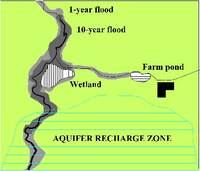- England
- Scotland
- France
- Holland
- Germany
- Italy
- Spain
- Portugal
- USA
- China
- Japan
- India
- Iran
- Advice
- Gardens
- England
- Scotland
- France
- Holland
- Germany
- Italy
- Spain
- Portugal
- USA
- China
- Japan
- India
- Iran
- Advice
- Garden Tours
Book: Landscape Planning and Environmental Impact Design: from EIA to EID
Chapter: Chapter 7 Agriculture, farming and countryside policy
Land on the edge of rivers is especially valuable for the detention and infiltration of floodwater. This land should be allowed to flood and the water should be kept on the land, rather in the manner of traditional watermeadows. When the above measures have been investigated, a Water Conservation Plan for agricultural land should be prepared [Fig 7.5]. Farmers can be paid to harvest water, as they are to harvest crops. 7.5 Agricultural land can assist in water management, by flood detention and infiltration. Habitat creation and conservation The agricultural landscape should provide a diverse range of habitats for wild plants and animals. We dream of a countryside rich in wild flowers and wild animals, so much more delightful than the urban desert or concrete jungle [Fig 7.6]. But today's agri-business farms have a narrower range of plant and animal species than a normal town. Pesticides kill insects. Birds have little to eat. Land drainage and water pollution spoil ditches. Frogs, foxes, magpies and hedgehogs are more numerous in suburban gardens than in the countryside. This is not in the public interest. The action which should be taken includes conservation of existing habitats, creation of new habitats and interlinking of habitats to form networks. Conservation of existing habitats can only be done when surveys have been carried out. This will require a field survey, a historical investigation and discussions with local naturalists. The creation and enhancement of habitats can often follow on from the water conservation measures discussed in the preceding section. Farm ponds, riparian land and marginal land are well suited to becoming wildlife habitats. Farmers can be paid a wage for carrying out the capital works and maintenance operations proposed in the habitat creation plan. Public agencies can either purchase the land on which the works are carried out, or pay a rent to use the land to obtain public goods.
